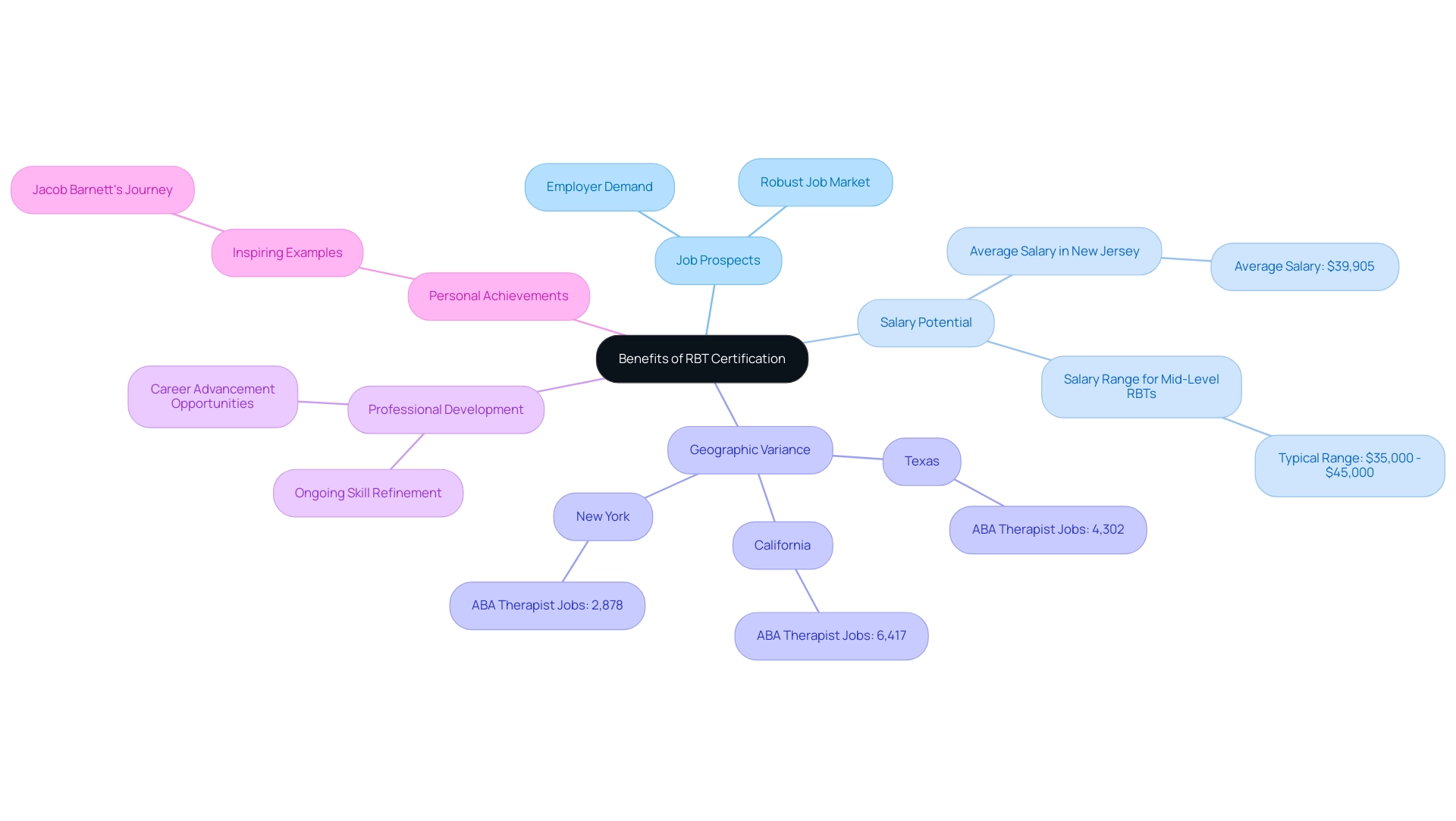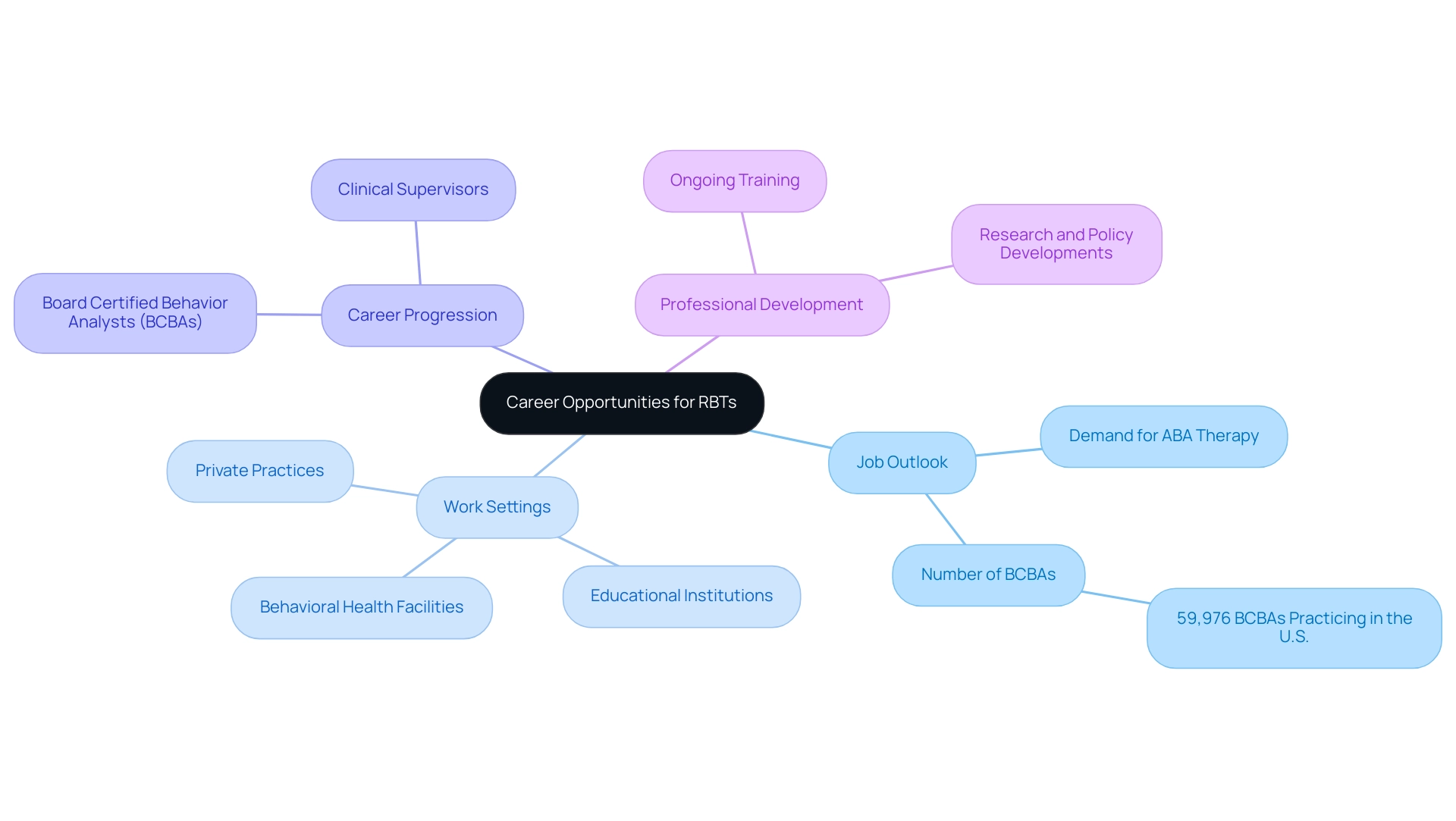Introduction
In the evolving landscape of Applied Behavior Analysis (ABA) therapy, the Registered Behavior Technician (RBT) certification has emerged as a crucial credential for professionals dedicated to supporting individuals with autism and related disorders. This certification not only signifies a commitment to ethical practice and effective intervention but also opens doors to a wealth of career opportunities in a field experiencing unprecedented growth.
With an increasing number of candidates pursuing RBT certification and a robust job market awaiting qualified professionals, understanding the steps to achieve this credential is essential. This article delves into the intricacies of RBT certification, exploring its benefits, the promising job outlook for RBTs, and a clear roadmap to navigating the certification process.
By equipping aspiring behavior technicians with the knowledge they need, it empowers them to make informed decisions that can profoundly impact their careers and the lives of the children and families they serve.
Understanding RBT Certification: An Overview
The Registered Behavior Technician (RBT) credential stands as a vital qualification, ensuring that professionals are equipped to deliver Applied Behavior Analysis (ABA) therapy effectively under the guidance of a Board Certified Behavior Analyst (BCBA). To achieve RBT status, candidates are required to complete a comprehensive 40-hour training program. This training encompasses essential principles of behavior analysis and ethical practices, forming a cornerstone for anyone aiming to succeed in this field.
In 2022, a total of 78,684 candidates were tested for RBT credentials, with a remarkable 130,273 individuals ultimately becoming certified, achieving a first-time passing rate of 77%. This statistic highlights not only the growing number of certified professionals but also the importance of thorough training in facilitating successful outcomes. Additionally, the recent $55-million funding round secured by Forta for its parent-led RBT platform underscores the increasing investment and interest in RBT training resources, which is particularly relevant for parent advocates.
As pointed out by a specialist in the area, aspiring behavior analysts can position themselves for a return on their investment and early career success by choosing a program with a track record of success in preparing students for the qualification exam. Moreover, examining BACB pass rate data from 2015 to 2019 highlights the importance of program features concerning success in obtaining credentials. Understanding these foundational aspects is crucial for evaluating whether pursuing RBT credentials aligns with your career aspirations in ABA therapy and if RBT certification is worth it for ensuring the best support for your child's needs.
The Benefits of RBT Certification: Why It Matters
Considering the wealth of advantages that can significantly impact your career in the ABA field, many wonder, is RBT certification worth it? Not only does it enhance job prospects, but it also raises the question of whether RBT certification is worth it, as it provides a pathway to increased earning potential and greater recognition within the community of professionals dedicated to supporting individuals with autism. As employers actively seek certified RBTs for direct ABA therapy roles, many are wondering if RBT certification is worth it, given the surge in demand for qualified candidates.
In fact, the job market for RBTs remains robust, raising the question of whether RBT certification is worth it, with New Jersey alone boasting 1,804 positions available, offering an average salary of $39,905. Comparatively, California leads with 6,417 ABA therapist jobs, followed by Texas and New York, indicating a significant geographic variance in job opportunities and salary potential. For mid-level RBTs with two to five years of experience, salaries usually vary from $35,000 to $45,000 across the country, as highlighted by Ralph Moller, demonstrating the financial advantages of qualification.
Furthermore, obtaining this credential raises the important question of whether RBT certification is worth it, as it opens doors to ongoing professional development, allowing RBTs to refine their skills and advance their careers. As 2024 unfolds, the impact of RBT credentials on job prospects prompts many to consider if RBT certification is worth it, as it continues to provide certified professionals with a competitive edge that is crucial in today’s evolving job market. The journey of individuals such as Jacob Barnett serves as an inspiring example of how RBT qualification can lead to significant personal and professional achievements.

Career Opportunities and Job Outlook for RBTs
The job outlook for Registered Behavior Technicians (RBTs) is exceptionally promising, driven by the burgeoning demand for Applied Behavior Analysis (ABA) therapy services across various settings, including schools and clinics that support children with autism and related disorders. With the average age for a reliable autism diagnosis being around 2 years and intervention typically starting at 4.7 years, the urgency for skilled RBTs is clear. As of now, there are approximately 59,976 Board Certified Behavior Analysts (BCBAs) practicing in the U.S., indicating a robust network of professionals dedicated to this field.
RBTs frequently secure positions within:
- Educational institutions
- Behavioral health facilities
- Collaborative teams in private practices
With a commitment to ongoing professional development and specialized training, RBTs can progress into advanced roles such as:
- Board Certified Behavior Analysts
- Clinical supervisors
This upward mobility not only enhances their career trajectories but also amplifies their positive impact on the lives of children and families navigating the complexities of autism diagnosis and intervention.
As noted by Imed Bouchrika, PhD Co-Founder and Chief Data Scientist, 'Through our research, including contacting alumni, attending virtual information sessions, and carefully reviewing program materials, this article will present students with knowledge crucial to making an informed decision that aligns with individual learning goals and career aspirations as BCBAs.' As the field continues to evolve, the job growth projections for RBTs in 2024 suggest even more opportunities for those passionate about making a difference in the lives of children and their families. Moreover, ongoing research and policy developments are critical to ensuring sustained support for individuals with autism, further underscoring the importance of RBT roles in the current landscape.

Navigating the RBT Certification Process: Steps to Success
Successfully navigating the RBT qualification process raises the question of whether RBT certification is worth it, as it is an empowering journey that can unlock numerous opportunities in the field of applied behavior analysis. Here’s a step-by-step guide to help you achieve your certification:
- Complete a 40-hour training program: Begin by enrolling in a BACB-approved training course that thoroughly covers essential ABA principles and ethics, laying a strong foundation for your skills.
- Gain supervised experience: Work under the guidance of a Board Certified Behavior Analyst (BCBA) to accumulate practical experience in implementing ABA techniques. This supervised experience is crucial for developing your competencies.
- Apply for the exam: Once you feel ready, submit your application through the BACB website to take the RBT exam, marking a significant milestone in your journey.
- Prepare for the exam: It generally takes around 1 to 2 months to adequately prepare for the RBT qualification exam. Use study guides and practice exams to ensure you are well-prepared. Real-world examples from successful candidates indicate that targeted preparation strategies can greatly enhance your success rates.
- Pass the RBT exam: Aim to successfully complete the examination, which is a vital step in earning your RBT credential. Remember, the retake policy allows for a total of eight attempts within a 12-month approval period, which can alleviate anxiety about passing the exam.
- Maintain credentials: After obtaining your credentials, remember to adhere to ongoing supervision and renewal requirements to keep them up to date.
Additionally, consider exploring the case study titled "Effective ABA Therapy Skill Building," which focuses on key components and strategies for successful skill building in ABA therapy. By following these steps, you can approach the RBT qualification process with confidence and clarity, paving the way for a rewarding career. The growth of employment opportunities—projected to rise by 42% from 2012 to 2022 according to the Bureau of Labor Statistics—highlights the increasing demand for behavior technicians and prompts the question, is RBT certification worth it in today’s job market?
Conclusion
The journey to obtaining the Registered Behavior Technician (RBT) certification is not only a pathway to personal and professional development but also a crucial step in enhancing the quality of support provided to individuals with autism and related disorders. By completing a comprehensive 40-hour training program, gaining supervised experience, and successfully passing the certification exam, aspiring RBTs position themselves for a rewarding career in a field that is witnessing remarkable growth.
The benefits of RBT certification extend far beyond individual achievement; they resonate throughout the community. Certified RBTs find themselves in high demand, with ample job opportunities and competitive salaries across various regions. This credential not only enhances career prospects but also fosters a sense of recognition and accomplishment within the professional community dedicated to making a positive impact on the lives of children and their families.
As the landscape of ABA therapy continues to evolve, the significance of the RBT role becomes increasingly evident. With promising job outlooks and ongoing professional development opportunities, RBTs can look forward to a fulfilling career that not only meets the pressing needs of the community but also contributes to their personal growth and success. Empowered with the right knowledge and resources, aspiring behavior technicians can confidently navigate the certification process, ultimately transforming their aspirations into reality while making a lasting difference in the lives of those they serve.
Frequently Asked Questions
What is the Registered Behavior Technician (RBT) credential?
The RBT credential is a vital qualification that ensures professionals are equipped to deliver Applied Behavior Analysis (ABA) therapy effectively under the guidance of a Board Certified Behavior Analyst (BCBA.)
What are the requirements to achieve RBT status?
Candidates must complete a comprehensive 40-hour training program that covers essential principles of behavior analysis and ethical practices.
How many candidates were tested for RBT credentials in 2022?
In 2022, a total of 78,684 candidates were tested for RBT credentials.
What was the first-time passing rate for RBT certification in 2022?
The first-time passing rate for RBT certification in 2022 was 77%, with 130,273 individuals ultimately becoming certified.
Why is thorough training important for RBT candidates?
Thorough training is crucial for facilitating successful outcomes in ABA therapy, as indicated by the high number of certified professionals and the passing rates.
What recent development highlights the investment in RBT training resources?
A recent $55-million funding round secured by Forta for its parent-led RBT platform underscores the increasing investment and interest in RBT training resources.
How can aspiring behavior analysts maximize their chances of success in the RBT qualification exam?
Aspiring behavior analysts can enhance their chances of success by choosing a program with a proven track record of preparing students for the qualification exam.
What should candidates consider when evaluating RBT training programs?
Candidates should examine BACB pass rate data and program features from 2015 to 2019 to understand how these aspects influence success in obtaining credentials.




